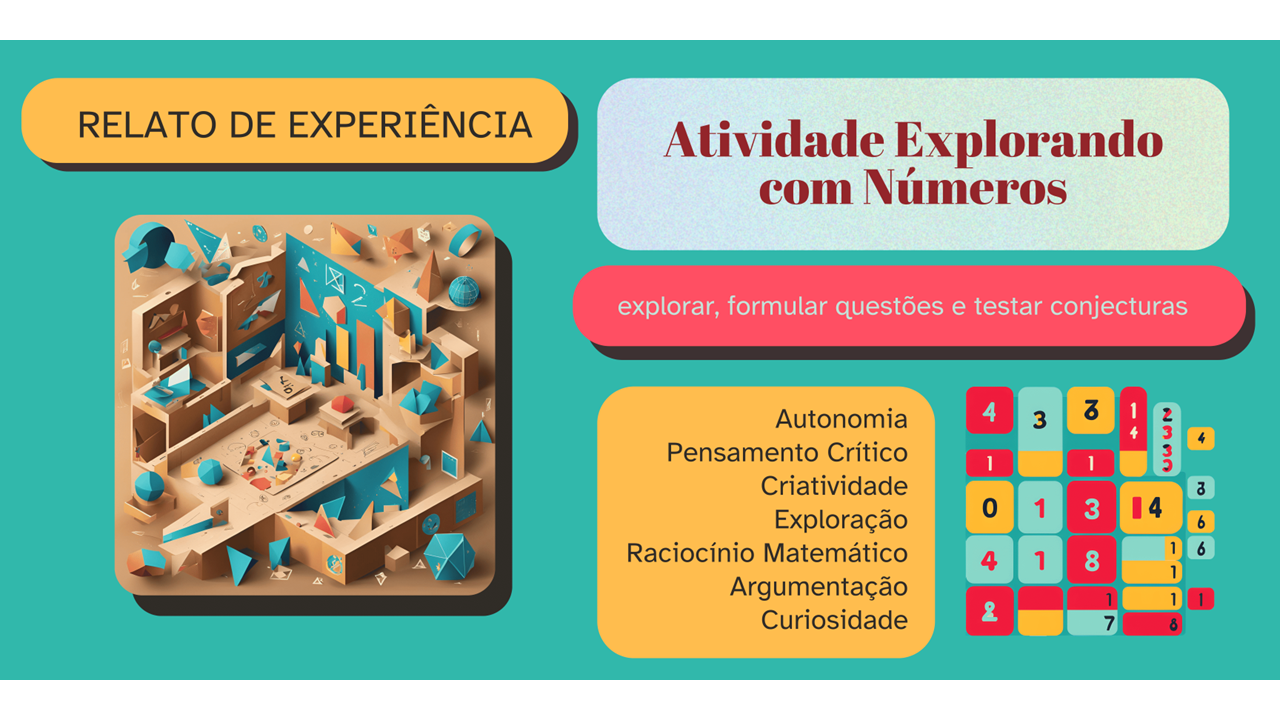Use of Mathematical Investigation in Sixth Grade Classes of Elementary School with the Activity Exploring with Numbers
Keywords:
Mathematics teaching, Critical Mathematics Education, Scenarios for investigation, Basic educationAbstract
This paper presents a reflection and a report of a classroom experience on the use of the mathematical investigation teaching methodology for learning in basic education, with the aim of understanding what possibilities and gains the use of mathematical investigation activities can offer in sixth grade classes in the final years of elementary school. Referenced by learning environments and Critical Mathematics, the moments of a mathematical investigation class are composed of open activities where the student formulates and answers their own questions, on a theme proposed and mediated by the teacher. The activity proposed and reported in this text was entitled Exploring with Numbers, and was carried out in mathematics classes, with the aim of motivating and encouraging the practice of mathematical investigation with students and, at the same time, analyzing the way in which students carried out the investigation process and, thus, analyzing its effectiveness, in order to improve teaching practice and student learning. Regarding the methodology, the work had a qualitative approach and, regarding the objectives, the approach was exploratory. It was observed that the students were effectively involved in the process of mathematical investigation, presenting during its completion important aspects for the development of logical mathematical thinking and skills expected for the subject, such as the ability to argue, solve problems and write in mathematical language. The use of mathematical investigation enables the teaching of mathematics in a critical and understanding way.
References
BRASIL. Ministério da Educação. Secretaria da Educação Básica. Base nacional comum curricular. Brasília, DF, 2018.
FONSECA, Helena; BRUNHEIRA, Lina; PONTE, JP da. As actividades de investigação, o professor e a aula de Matemática. Actas do ProfMat, v. 99, p. 91-101, 1999.
GERHARDT, Tatiana Engel; SILVEIRA, Denise Tolfo. Métodos de pesquisa. Plageder, 2009.
GIL, Antonio Carlos. Como elaborar projetos de pesquisa. Editora Atlas SA, 2002.
LÜDKE, M.; ANDRÉ, M. Pesquisa em Educação: Abordagens Qualitativas. São Paulo: EPU, 1986.
MÜLLER, Iraci. Tendências atuais de educação matemática. Revista de ensino, educação e ciências humanas, v. 1, n. 1, 2000.
OLIVEIRA, Hélia Margarida; SEGURADO, Maria Irene; PONTE, João Pedro da. Tarefas de investigação em matemática: histórias da sala de aula. 1998. Disponível em:<https://www.researchgate.net/profile/Joao-Ponte-2/publication/238783691_Tarefas_de_investigacao_em_Matematica_Historias_da_sala_de_aula/links/00463528156df859be000000/Tarefas-de-investigacao-em-Matematica-Historias-da-sala-de-aula.pdf >. Acesso em: 10 jun. 2024.
PONTE, João Pedro da; BROCARDO, Joana; OLIVEIRA, Hélia. Investigações matemáticas na sala de aula. Autêntica, 2003.
PONTE, João Pedro Mendes da. Investigar, ensinar e aprender. Actas do ProfMat, Lisboa, Portugal: Faculdade de Ciências, Universidade de Lisboa, p. 25-39, 2003.
PONTE, João Pedro da et al. O trabalho do professor numa aula de investigação matemática. Quadrante, v. 7, n. 2, p. 41-70, 1998.
PONTE, J. P, OLIVEIRA, H., CUNHA, M. H., SEGURADO, M. I. Histórias de investigações Matemáticas. Lisboa: Inst. Inov. Educacional, 1998.
SKOVSMOSE, Ole. Cenários para investigação. Bolema-Boletim de Educação Matemática, v. 13, n. 14, p. 66-91, 2000.
ZORZAN, Adriana Salete Loss. Ensino-Aprendizagem: Algumas tendências na educação matemática. Revista de Ciências Humanas, v. 8, n. 10, p. 77-94, 2007.

Downloads
Published
How to Cite
Issue
Section
License
Proposta de Política para Periódicos de Acesso Livre
Autores que publicam nesta revista concordam com os seguintes termos:
- Autores mantém os direitos autorais e concedem à revista o direito de primeira publicação, com o trabalho simultaneamente licenciado sob a Licença Creative Commons Attribution que permite o compartilhamento do trabalho com reconhecimento da autoria e publicação inicial nesta revista.
- Autores têm autorização para assumir contratos adicionais separadamente, para distribuição não-exclusiva da versão do trabalho publicada nesta revista (ex.: publicar em repositório institucional ou como capítulo de livro), com reconhecimento de autoria e publicação inicial nesta revista.
- Autores têm permissão e são estimulados a publicar e distribuir seu trabalho online (ex.: em repositórios institucionais ou na sua página pessoal) a qualquer ponto antes ou durante o processo editorial, já que isso pode gerar alterações produtivas, bem como aumentar o impacto e a citação do trabalho publicado (Veja O Efeito do Acesso Livre).
